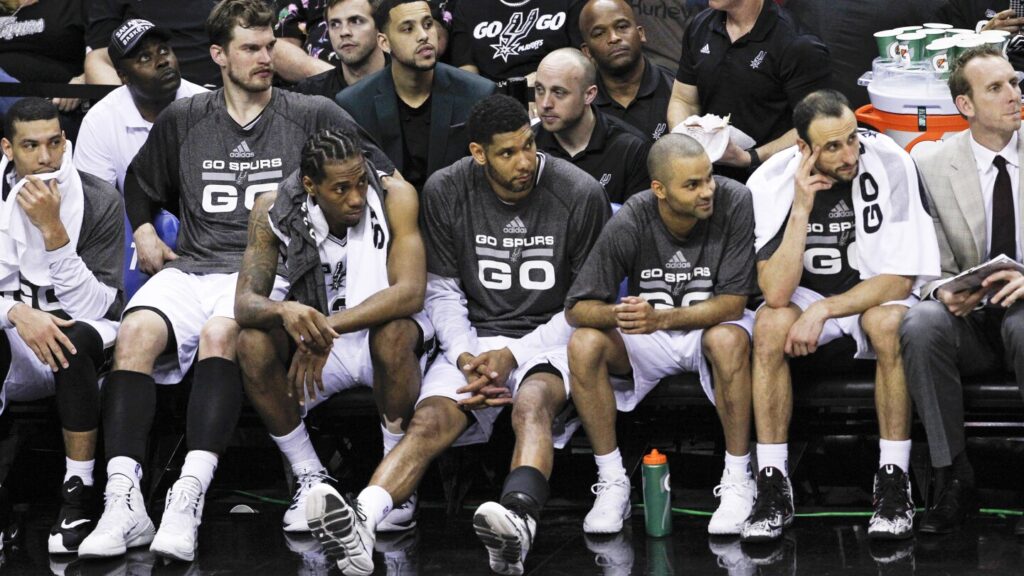[ad_1]

As soon as a titan within the NBA panorama, the San Antonio Spurs’ prominence has considerably declined over latest years. Gone are the times when Tim Duncan, Manu Ginóbili, and Tony Parker led the crew to a number of championships underneath the genius teaching of Gregg Popovich. The Spurs have transitioned from being perennial title contenders to struggling for a spot within the playoffs, prompting followers and analysts alike to ask: What occurred?
Because the San Antonio Spurs odds of reclaiming their former glory proceed to dwindle, a nuanced evaluation of key contributing elements presents perception into how the franchise has misplaced its footing. From an getting older roster and the departure of cornerstone gamers to a scarcity of younger famous person expertise, adjustments within the NBA’s aggressive panorama, latest front-office selections, and shifts within the crew’s vaunted tradition—every performs a job within the story of the Spurs’ decline.
The Ageing Core and Departure of Stars
The getting older and subsequent retirement of the Spurs’ legendary “Massive Three” — Tim Duncan, Manu Ginóbili, and Tony Parker — marked the top of an period and signaled the start of the franchise’s decline. These gamers weren’t simply distinctive abilities; they embodied Spurs tradition, instrumental in 5 NBA championships over almost twenty years. As these linchpins grew older and retired, the Spurs confronted the arduous activity of changing their on-court manufacturing, management, and cultural influence.
The state of affairs worsened when Kawhi Leonard, initially pegged because the inheritor obvious, compelled a commerce in 2018. Shedding a participant of Leonard’s caliber with no clear succession plan dealt a crippling blow to the crew’s competitiveness, laying naked the difficulties of easily transitioning from one profitable period to a different.
Lack of Younger Celebrity Expertise
In at present’s NBA, the place the presence of younger famous person expertise usually dictates a franchise’s long-term success, the San Antonio Spurs discover themselves at a drawback. Whereas they’ve managed to draft competent gamers like Devonte Graham and Jeremy Sochan, they’ve but to show to be game-changers able to elevating the crew to championship rivalry. This dearth of elite younger expertise places the Spurs in a precarious place because the league continues to be dominated by dynamic duos and famous person trios.
Groups just like the Brooklyn Nets, Los Angeles Lakers, and even the rising Phoenix Suns have invested in younger superstars or star-driven partnerships, leaving the Spurs struggling to maintain tempo. This lack of a marquee participant impacts the crew’s on-court efficiency and hampers its attraction in an more and more star-driven league.
Altering NBA Panorama
The NBA has undergone important transformations lately, largely pushed by analytics, the three-point revolution, and the rise of “positionless basketball.” These adjustments have had an outsized influence on the declining fortunes of the San Antonio Spurs. Throughout their years of dominance, the Spurs’ system thrived on basic basketball, together with mid-range taking pictures, disciplined play, and sturdy protection.
Nonetheless, as groups just like the Golden State Warriors have demonstrated, a faster-paced, three-point-centric offense may be exceedingly efficient. The Spurs’ extra conventional strategy has been rendered much less potent in opposition to these evolving offensive methods. Because the league has moved in the direction of this new paradigm, the Spurs have discovered it more and more troublesome to adapt, placing them at a drawback in a league that now prioritizes spacing, tempo, and long-range taking pictures.
Entrance Workplace Choices
As soon as famend for his or her shrewdness in expertise acquisition and participant improvement, the Spurs’ entrance workplace has lately confronted scrutiny for its decision-making. The commerce that despatched Kawhi Leonard to the Toronto Raptors in change for DeMar DeRozan serves as a main instance. Whereas DeRozan is undoubtedly gifted, he couldn’t replicate Leonard’s game-changing, two-way influence, setting the franchise again by way of competitiveness. Nonetheless, a glimmer of hope emerged with the 2023 first-overall draft pick, Victor Wembanyama.
His choice might signify a turning level, nevertheless it additionally underlines the urgency of the state of affairs—the Spurs haven’t been able to make such a excessive draft decide in many years. Regardless of this hopeful acquisition, previous draft selections and less-than-inspiring free company strikes have contributed to the Spurs’ decline, casting doubt on their potential to swiftly reclaim their standing as one of many NBA’s elite groups.
Cultural Components
One of many much less mentioned but equally impactful elements within the decline of the San Antonio Spurs is the refined shift within the crew’s once-storied tradition. Beneath Coach Gregg Popovich, the Spurs had been famend for his or her disciplined, no-nonsense strategy to the sport and an organizational ethos rooted in teamwork and character. This tradition was fortified by the lengthy tenures of Tim Duncan, Manu Ginóbili, and Tony Parker, who excelled on the courtroom and served as cultural anchors.
Nonetheless, with their departures and different long-standing workers members, there was a gradual dilution of this cohesive organizational material. Whereas not as simply quantifiable as roster strikes or recreation stats, this erosion of cultural capital has been a essential, if intangible, element of the Spurs’ latest struggles.
Conclusion
The decline of the San Antonio Spurs may be traced again to a confluence of things which have slowly chipped away on the franchise’s once-imposing stature. The getting older and departure of key gamers like Duncan, Ginóbili, and Parker set the stage for a difficult transitional interval, exacerbated by the shortage of rising younger superstars to take up the mantle. Add to that the evolving panorama of the NBA, which has moved in the direction of a method of play much less conducive to the Spurs’ conventional strengths.
Current front-office selections, together with trades and draft picks, have been much less impactful than in earlier years, apart from buying this 12 months’s first draft decide. Lastly, an intangible but essential component—organizational tradition—has additionally shifted, subtly affecting the crew’s efficiency and cohesion. These components contribute to a posh tapestry that explains the Spurs’ ongoing wrestle to reclaim their former glory.
[ad_2]
Source link


